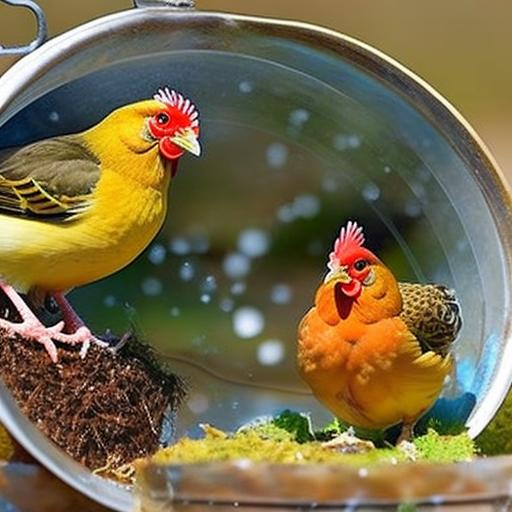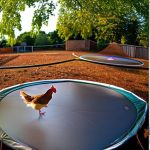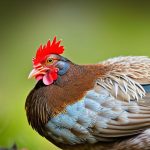Hydration is crucial for the overall health and well-being of chickens, regardless of the season. However, it becomes even more important during the winter months when cold weather can have a significant impact on a chicken’s water consumption. In this article, we will explore the effects of cold weather on chicken hydration and provide tips and strategies for ensuring that your chickens stay hydrated and healthy during the winter months.
Chickens, like all animals, require water to survive. Water plays a vital role in digestion, nutrient absorption, temperature regulation, and overall bodily functions. Without adequate hydration, chickens can experience a range of health issues, including decreased egg production, poor growth, weakened immune system, and even death.
During the winter months, when temperatures drop significantly, chickens may be less likely to drink water. This can be attributed to several factors. Firstly, chickens tend to eat less during cold weather, which means they may not be getting as much water from their food as they normally would. Additionally, cold weather can cause water to freeze, making it inaccessible to chickens. This can lead to dehydration if not addressed properly.
Key Takeaways
- Hydration is important for chickens in winter to maintain their health and egg production.
- Cold weather can affect chicken hydration, leading to dehydration and other health issues.
- Choosing the right waterer and preventing water freezing are crucial for ensuring chickens have access to clean water.
- Insulation and heated waterers can help prevent water from freezing and keep chickens hydrated.
- Monitoring water consumption and exploring alternative hydration methods can also help keep chickens healthy during winter.
Understanding the Effects of Cold Weather on Chicken Hydration
Cold weather can have a significant impact on a chicken’s water consumption. When temperatures drop, chickens tend to eat less and therefore consume less water from their food. This can lead to dehydration if they are not provided with an alternative source of water.
Furthermore, cold weather can cause water to freeze, making it difficult for chickens to access. Chickens rely on liquid water for hydration and cannot consume ice or snow as a substitute. If their water source freezes over, they may become dehydrated quickly.
In addition to decreased water consumption, cold weather can also affect a chicken’s body temperature regulation. Chickens are warm-blooded animals and need to maintain a constant body temperature. When they are exposed to cold temperatures, their bodies work harder to stay warm, which can lead to increased water loss through respiration and evaporation. This further emphasizes the importance of providing chickens with an adequate and accessible water source during the winter months.
Tips for Choosing the Right Waterer for Your Chickens in Winter
Choosing the right waterer for your chickens in winter is essential to ensure that they have access to clean and unfrozen water at all times. There are several types of waterers available, each with its own advantages and disadvantages.
One common type of waterer is the traditional open-top dish or bowl. These are simple and easy to use, but they are also more prone to freezing in cold weather. If you choose to use an open-top dish, it is important to check it frequently and remove any ice that may have formed.
Another option is a nipple waterer, which consists of a small metal or plastic nipple that releases water when pecked by the chicken. Nipple waterers are less likely to freeze compared to open-top dishes, as the water is not exposed to the elements. However, they can be more difficult for chickens to learn how to use, especially if they have not been exposed to this type of waterer before.
A third option is a heated waterer, which is specifically designed to prevent water from freezing in cold temperatures. These waterers typically have a built-in heating element that keeps the water at a constant temperature above freezing. Heated waterers are highly effective in preventing freezing, but they do require access to electricity.
How to Prevent Water Freezing in Chicken Waterers
| Method | Description |
|---|---|
| Insulation | Wrap the waterer with insulation material to keep the water from freezing. |
| Heating Element | Install a heating element in the waterer to keep the water from freezing. |
| Heated Base | Use a heated base under the waterer to keep the water from freezing. |
| Frequent Refilling | Refill the waterer frequently to prevent the water from freezing. |
| Use Warm Water | Use warm water to fill the waterer to prevent the water from freezing. |
Preventing water from freezing in chicken waterers is crucial for ensuring that your chickens have access to clean and unfrozen water at all times. There are several methods that can be used to prevent freezing, each with its own pros and cons.
One common method is using a heated base or pad underneath the waterer. These devices provide a constant source of heat, preventing the water from freezing. However, they do require access to electricity and may not be suitable for all situations.
Another method is using insulation to keep the waterer warm. Insulation can be achieved by wrapping the waterer in insulating material such as foam or bubble wrap. This helps to retain the heat generated by the chickens’ body temperature and prevents freezing. However, it is important to ensure that the insulation does not interfere with the chickens’ access to the water.
A third method is using additives or substances that lower the freezing point of water. There are commercially available products that can be added to the water to prevent freezing. These additives work by lowering the freezing point of water, making it less likely to freeze in cold temperatures. However, it is important to carefully follow the instructions provided by the manufacturer when using these products.
Using Insulation to Keep Your Chicken Waterers from Freezing
Insulation can be an effective method for preventing water from freezing in chicken waterers during the winter months. By wrapping the waterer in insulating material, you can help retain the heat generated by the chickens’ body temperature and prevent freezing.
To properly insulate a chicken waterer, start by selecting an appropriate insulating material. Foam insulation or bubble wrap are commonly used for this purpose. Cut the material to fit around the waterer, leaving enough space for the chickens to access the water.
Wrap the insulating material tightly around the waterer, ensuring that there are no gaps or openings where cold air can enter. Secure the insulation in place using tape or zip ties. It is important to regularly check the insulation for any signs of wear or damage and replace it if necessary.
In addition to insulating the waterer itself, you can also insulate the area surrounding it. This can be done by placing straw or hay around the waterer to create a barrier against the cold. This helps to further insulate the waterer and prevent freezing.
The Benefits of Using Heated Waterers for Your Chickens in Winter

Using heated waterers can provide several benefits for your chickens during the winter months. These waterers are specifically designed to prevent water from freezing, ensuring that your chickens have access to clean and unfrozen water at all times.
One of the main benefits of using heated waterers is convenience. These waterers require minimal maintenance and do not require frequent checking or thawing like other types of waterers. Once installed, they provide a constant source of unfrozen water for your chickens.
Heated waterers also help to ensure that your chickens stay hydrated, even in extremely cold temperatures. By providing a constant source of unfrozen water, you can help prevent dehydration and its associated health issues.
Furthermore, heated waterers can help to improve egg production during the winter months. Adequate hydration is essential for egg production, and by providing your chickens with a constant source of unfrozen water, you can help maintain their overall health and productivity.
When choosing a heated waterer, it is important to consider factors such as size, capacity, and power source. Select a waterer that is appropriate for the number of chickens you have and ensure that it has enough capacity to provide an adequate amount of water throughout the day. Additionally, choose a power source that is suitable for your setup, whether it be electricity or solar power.
How to Keep Your Chicken Waterers Clean and Free from Contamination
Keeping chicken waterers clean and free from contamination is essential for maintaining the health and well-being of your chickens. Dirty or contaminated water can lead to various health issues, including bacterial infections and diseases.
To keep your chicken waterers clean, start by regularly emptying and refilling them with fresh water. This should be done at least once a day, or more frequently if necessary. Remove any debris or dirt that may have accumulated in the waterer and rinse it thoroughly before refilling.
It is also important to regularly clean and disinfect the waterer to prevent the growth of bacteria and other pathogens. Use a mild detergent or poultry-safe disinfectant to clean the waterer, ensuring that all surfaces are thoroughly cleaned. Rinse the waterer well after cleaning to remove any residue from the detergent or disinfectant.
In addition to regular cleaning, it is important to protect the waterer from contamination. Place the waterer in a clean and dry area, away from areas where chickens defecate or where other animals may have access. This helps to prevent contamination from feces, dirt, or other sources of bacteria.
Regularly inspect the waterer for any signs of damage or wear and replace any parts that are broken or worn out. This helps to ensure that the waterer remains in good working condition and provides clean and uncontaminated water for your chickens.
The Importance of Monitoring Your Chickens’ Water Consumption in Winter
Monitoring your chickens’ water consumption in winter is important for ensuring that they are staying hydrated and healthy. By keeping track of how much water your chickens are drinking, you can identify any potential issues or health problems early on.
One way to monitor your chickens’ water consumption is by regularly checking the water level in their waterers. If you notice that the water level is consistently low, it may indicate that your chickens are not drinking enough water. This could be due to a variety of factors, such as cold weather, stress, or health issues.
Another method is to observe your chickens’ behavior around the waterer. Healthy chickens will typically drink water throughout the day, so if you notice that your chickens are not showing interest in the waterer or are avoiding it altogether, it may be a sign that they are not getting enough water.
Additionally, monitoring your chickens’ water consumption can help you identify any potential health issues. For example, a sudden increase in water consumption could be a sign of an underlying health problem, such as a respiratory infection or kidney disease. Conversely, a decrease in water consumption could indicate dehydration or other health issues.
To accurately monitor your chickens’ water consumption, it is important to keep detailed records. This can be done by measuring the amount of water you add to the waterer each day and comparing it to the amount that is left at the end of the day. By keeping track of these measurements over time, you can identify any patterns or changes in your chickens’ water consumption.
Alternative Ways to Keep Your Chickens Hydrated in Winter
In addition to using traditional waterers, there are alternative methods for keeping chickens hydrated in the winter. These methods can be used in conjunction with or as a supplement to traditional waterers to ensure that your chickens have access to clean and unfrozen water at all times.
One alternative method is using heated bowls or buckets. These are similar to heated waterers but are designed to hold larger volumes of water. Heated bowls or buckets can be placed in the chicken coop or run and provide a constant source of unfrozen water for your chickens.
Another method is using heated pet mats or pads. These devices are typically designed for dogs or cats but can also be used for chickens. Place the heated mat or pad underneath the waterer to prevent freezing. However, it is important to ensure that the mat or pad is suitable for outdoor use and can withstand the elements.
Additionally, you can provide your chickens with warm or hot water during extremely cold temperatures. This can be done by adding warm water to their regular waterer or by providing them with warm water separately. However, it is important to monitor the temperature of the water to ensure that it is not too hot and does not pose a risk of scalding.
Ensuring Your Chickens Stay Hydrated and Healthy During the Winter Months
In conclusion, hydration is crucial for the health and well-being of chickens, especially during the winter months. Cold weather can have a significant impact on a chicken’s water consumption, making it important to provide them with an adequate and accessible water source.
Choosing the right waterer, preventing water freezing, using insulation, and monitoring your chickens’ water consumption are all important steps in ensuring that your chickens stay hydrated and healthy during the winter months. Additionally, alternative methods such as using heated waterers or providing warm water can be used to supplement traditional waterers.
By taking these steps and implementing proper hydration strategies, you can help ensure that your chickens stay hydrated and healthy throughout the winter months. Remember to regularly check and maintain your chicken waterers to prevent contamination and provide clean and unfrozen water for your chickens.
If you’re looking for more information on keeping chickens, you might also be interested in this article on how to insulate a chicken coop. Insulating your coop is essential, especially during the winter months when temperatures drop and freezing water becomes a concern. This article provides helpful tips and techniques to keep your chickens warm and comfortable, ensuring their well-being and productivity all year round.
FAQs
What causes chicken water to freeze?
During winter, the temperature drops below freezing point, causing the water in the chicken’s waterer to freeze.
Why is it important to keep chicken water from freezing?
Chickens need access to clean water at all times to stay hydrated and healthy. If their water freezes, they may become dehydrated, which can lead to health problems and even death.
What are some ways to keep chicken water from freezing?
Some ways to keep chicken water from freezing include using heated waterers, adding insulation to the waterer, using a heated base, and using a water heater.
What is a heated waterer?
A heated waterer is a waterer that has a built-in heating element that keeps the water from freezing. It is designed to keep the water at a temperature that is safe for chickens to drink.
What is a heated base?
A heated base is a device that is placed under the waterer to keep the water from freezing. It is designed to keep the waterer off the ground and to provide a source of heat to prevent the water from freezing.
What is a water heater?
A water heater is a device that is used to heat the water in the chicken’s waterer. It is designed to keep the water at a temperature that is safe for chickens to drink.
Meet Walter, the feathered-friend fanatic of Florida! Nestled in the sunshine state, Walter struts through life with his feathered companions, clucking his way to happiness. With a coop that’s fancier than a five-star hotel, he’s the Don Juan of the chicken world. When he’s not teaching his hens to do the cha-cha, you’ll find him in a heated debate with his prized rooster, Sir Clucks-a-Lot. Walter’s poultry passion is no yolk; he’s the sunny-side-up guy you never knew you needed in your flock of friends!







